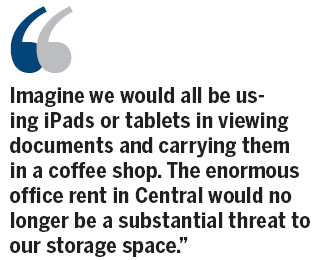'Digital' courts the answer for HK
Updated: 2013-07-03 05:40
By Andrew Mak(HK Edition)
|
|||||||
Despite the recent deep cuts in the UK budget for court services, it's interesting to learn that the UK government has pledged 160 million ($243 million) to make courtrooms fully digital by 2016, ending the British criminal justice system's "outdated" reliance on paper.
Justice Minister Damian Green was reported to have said that every year the courts and the Crown Prosecution Service use about 160 million sheets of paper. This would be mountains of paper, as it would be some 15 Mount Snowdon.
The UK's plans are ambitious. Policemen will be able to record information while they are on the beat and start putting together case files "from the street". Police evidence will routinely be given via video-link to avoid officers having to spend hours in court.

The UK initiatives would apparently include some that, if similarly adopted in Hong Kong, would be welcomed by the legal professions here. We do not limit ourselves to criminal cases. Civil cases are just as useful.
The British proposals include installing Wi-Fi facilities in most of Britain's 500 courts, so the prosecution, defense, judiciary and court staff can access all necessary documents. Imagine we would all be using iPads or tablets in viewing documents and carrying them in a coffee shop. The enormous office rent in Central would no longer be a substantial threat to our storage space.
In addition, there would be digital evidence screens to enable the defense and prosecution to present evidence, including closed-circuit television (CCTV) and other video footage, digitally. In this regard, our technology court has already demonstrated its usefulness and, perhaps, it's time to consider expanding its scope.
Also, there would be new court presentation and collaboration software allowing prosecution, defense and the judiciary to work on cases more easily. I'm always in favor of technology although some may suggest this is a complicated task. Confidentiality is also a question. However, it appears we do not need a sophisticated system as collaboration software has already been selling at the retail end for some time.
Last but not least, there would be funding to increase digital workings and reduce the use of paper in the system by the police and judicial system. What I think the monitors had troubled the users is that in the past, large screens were very expensive. Not so now. However, I would still think that it's useful that core bundles with physical paper would be necessary, with printing facilities so that insertions can be made if necessary.

Of course, much of the evidence in the lower courts would be in the Chinese language and there may be need for bilingual or even multilingual adaptations. In this regard, I believe we have already sufficient experience in the use of Chinese and other languages in the past 16 years.
I was impressed by the UK justice minister when he said: "If we are to win in the global race, this must change; it's time we move the court system into the 21st century". I often think that for Hong Kong to become the leader in our rule of law, and as an international and regional dispute resolution center, constant update of our technological ability is a necessity rather than a luxury.
In the UK, the concept of a "paperless" or "digital court" has been tested at Birmingham Magistrates' Court since March. It would not be long that the concept would be tested on a national basis. As we now have a free legal reference system for access to court cases, a bilingual laws information system for legislation and a web-based system to access the Legislative Council papers, it would not be interesting that we have to read our papers on a daily basis to upkeep our daily meal for law.
The author is a Hong Kong barrister and chairman of the Hong Kong Bar's Special Committee on Planning and Policy.
(HK Edition 07/03/2013 page7)